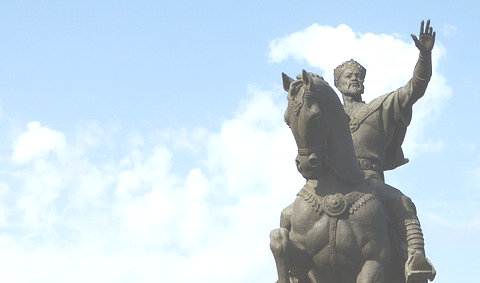Been kind of quiet here – busy, had a bit of a cold, and general crazy. Not too much to update folks on yet, though with the holidays coming up . . . well I do have my next generator plan queued up. Something I’ve been kicking around for awhile. Pretty much planning to hold the next “Deep” generator off for a bit.
So a Happy Thanksgiving where applicable and Happy Holidays to all.
– Steven Savage
Steven Savage is a Geek 2.0 writer, speaker, blogger, and job coach. He blogs on careers at http://www.musehack.com/, publishes books on career and culture at http://www.informotron.com/, and does a site of creative tools at http://www.seventhsanctum.com/. He can be reached at http://www.stevensavage.com/.

(Way With Worlds Runs at Seventh Sanctum, Muse Hack, and Ongoing Worlds)
I’m not quite Han Solo. You don’t have to tell me the odds, but I’d like a good sense of them when it comes to your world. But I do look good in leather.
When we play a game or ready a story, intuitively, we need to know the odds. If it’s unlikely someone can survive a fight with ten well armed Knights of The Singularity, when they win it makes us wonder how. If someone is ethnically and racially different than we expect in a game world, the impact of that difference is felt if we understand just what it means. Likelihood – and lack of likelihood – is something that we need to understand to get what something means.
I think this is instinctive to humans, and even more so in people with a vague sense of math and probability. We’re always evaluating, re-evaluating, projecting, and understanding. When math is part of our lives, even moreso. Either way, it’s human.
So the odds need to be part of your world. If they’re not, then you may be in for some problems. If you can’t express the chances of things happening, then your world isn’t going to make sense. People won’t be able to grasp what’s going on as their natural ability to evaluate can’t find anything to hold on to in order to make sense of the world.
(Even if you do know the odds, you might not use them right)
Lets talk what the odds are in your world, how to use them – and how not to overuse them. (more…)

(Way With Worlds Runs at Seventh Sanctum, Muse Hack, and Ongoing Worlds)
Having discussed character goals, abilities, plans, actions, and results, let’s talk about the stakes characters fight for.
Oh, and how we screw it up. And maybe how they screw it up, but that’s more “story” than “author messed it up.”
What Are We Fighting For?
Characters set out with certain goals and values and are trying to achieve something – even if that’s preventing something. They are, in short, fighting for something. It may not seem like a conflict, but if it’s not something easy to do, it’s a conflict of some kind.
We, as readers, are drawn into the goals because the world is believable, the characters well written, the gameplay compelling, etc. When the stakes are well-realized, when they are understandable, they both draw us into the world and enhance the experience. When stakes become our stakes, the goals our goals, the risk our risk, we’re truly involved – and the world we experience is truly alive.
If you’ve ever dodged in real life while playing an FPS or gotten angry at a fictional character, you know how compelling a world and its realization in fiction or media can be. The stakes are real.
Probably this is why we love viscerally. Even the worst film or story can make us sympathize with someone (no matter how poorly written) in a situation we relate to. We get humiliation or pain. Probably his is one reason authors and worldbuilders resort to blood, violence, sex, and fear too often – they’re visceral and have that chance to draw you in.
(Well visceral until you get tired of them).
So as you may guess, the Stakes are part of your world. They’re what gives us a tale, what makes characters believable, and what gives us a gut-punch realization of “what’s going on.”
Well, We Are Fighting For It, Right?
The things that occur in your world, the challenges and risks, are born of your setting – just like the characters who deal with them. They are part of the weather or he culture or the divine or the infernal that you’ve created. What’s going on, what’s at risk, is part of your setting.
Well, it is if you do it right.
Action-reaction, results, risks, are all part of good worldbuilding. You need to know what happens, what goes wrong, what results occur when things are done or aren’t done. When you know how things “work” then in turn you can understand the stakes of what’s going on, how the characters feel, the results they want. – and what draws in your reader or player. If your world isn’t properly defined, properly connected, it becomes unbelievable, the stakes are meaningless, there’s less visceral appeal, and suspension of disbelief gives up and goes and gets a coffee.
Ever read a story where the goals seemed lame, the risks trite or poorly-created, and the sense of what people are trying to do didn’t hold up? Or you’d seen it all before and felt like someone had brought in a Risky Stakes transplant from another story? The world wasn’t well designed, the stakes had no meaning, the characters had no meaning, and you were just there watching a pile of stuff.
You get the idea.
How you build your world sets the stakes for characters. Now that may seem obvious, but I find we get trapped in designing them or not even realizing them. We stop building the world and start just throwing stuff into it.
Overdone Stakes
(Yes, lame joke preserved from original column).
One problem in worldbuilding is that after we start writing our world, or coding it, we need to keep people’s interest, so we raise the stakes ridiculously. You’re probably especially aware of it from bad media and some games, where the villain apparently has a magical backside that holds plot devices, or suddenly the enemies are a lot tougher for no good reason. It’s just there to ramp up difficulty to maybe hold your attention.
This “ramp up”is often a natural result of increased competency on the part of the protagonists – as noted in last column, characters growing and applying themselves towards goal is part of any tale, and thus world. But we can way, way too easily fall into jacking up the difficulty level as it were to keep things going.
This is a risk because basically you throw out the laws of your world just to keep people’s attention. Now you might be able to keep it within setting constraints, but based on many things I’ve seen . . . I wouldn’t take the risk.
Now my answer to this is “just build a good world”, but there are traps we often fall into. So to help you out, let me note a few common ways of raising the Stakes that we can do with out:
- The End Of The World As We Know It – And I’m Annoyed – Turning things into world-threatening crises when they weren’t, aren’t, and can’t be explained may keep attention but is really obvious and worldbreaking.
- The War Of Heaven And Hell And Good Taste – Sometimes stories wander into supernatural territory and next thing you know everyday stuff or even non-everyday stuff is a theological smackdown. That’s good if that’s your intent, but trying to get metaphysical just to keep interest can be quite lame. You can also have the stakes raise to such ridiculous levels with pasted-on-morals that it might as well be a kind of Potemkin Apocalypse.
- The Last Best Extremely Contrived Hope – Another way people jack up the odds is creating a chosen one who’s the only person that can save things. THis is pretty much the aforementioned Idiot Plot or Planet of the Morons. And it’s unbelievable, worldbreaking, and annoying because it stands out (and it’s over done).
- The Destiny March of History – Suddenly, characters discover destiny, legacy, or something else that makes their struggles More Important. Meanwhile the audience doesn’t buy it.
- The Sudden Ramp-Up – Suddenly things are tougher . . . because. Not due to cause-and-effect. Not due to a master plan. Just you ramp up the stakes with some plot device to keep interest. Yes, it’s obvious.
Don’t jack up the stakes inappropriately. Don’t rip your world apart to wedge a piece of extra excitement in. It’ll break your system. And sure, some creators get away with it, but some don’t.
Do you want to take the risk? Are your stakes worth it?
No, they’re not. Build a good world. If anything, just find the most exciting parts of it to tell.
In Closing
Know the Stakes people are fighting for and what they’re trying to do. Understand the results – but let them be part of your setting. Otherwise you risk mapping tropes or easy-outs to keep interest – and people will know.
– Steven Savage
Steven Savage is a Geek 2.0 writer, speaker, blogger, and job coach. He blogs on careers at http://www.musehack.com/, publishes books on career and culture at http://www.informotron.com/, and does a site of creative tools at http://www.seventhsanctum.com/. He can be reached at http://www.stevensavage.com/.
(Originally posted at MuseHack.)
I met Alex Beecroft in doing research on writers and geek civics. Now we’ve probably seen all sorts of writing, but Alex puts herself in the middle of many genres – she does gay, historical, fantasy, romance, and mystery. She explores the edges, because thats where the stories often really are. (more…)
I hope this finds everyone well. As for what’s up with me? Well beyond getting tired of Borderlands The Pre-Sequel, and being weirdly interested in Overwatch . . .
- Seventh Sanctum has been getting more attention due to NaNoWriMo – and folks let me know what you’re up to! I’ve been occasionally calling out interesting NaNo updates on the Tumblr.
- I’m also still trying to make time to set up that mobile dev environment – I caught what was going around this week, which seriously, always happens when I have plans . . . also never work in a confined records room with 15 people.
- I’ve also penned the draft of the 52nd column on the Way With Worlds rewrite. Can you believe it’s been that long? Now I’m still doing rewrites so as you may guess it’s gonna be larger than the original run.
That’s it for me. What about you?
– Steven Savage
Steven Savage is a Geek 2.0 writer, speaker, blogger, and job coach. He blogs on careers at http://www.musehack.com/, publishes books on career and culture at http://www.informotron.com/, and does a site of creative tools at http://www.seventhsanctum.com/. He can be reached at http://www.stevensavage.com/.

(Way With Worlds Runs at Seventh Sanctum, Muse Hack, and Ongoing Worlds)
Stories, games, and all fictions are about people, about characters, about what they do and why. They may not be like us, we may not like them, but that’s what’s going on. We’re watching people (even if not human) do stuff to get results, though we may put it in more colorful ways.
Goals, methods of reaching them, and results are, in a way, everything a story is about. In the end, you’ve got to save the prince so you can throw the one ring into the fiery pit of the starship engine to bypass the alien invaders before your ninja rival does.* No goals, no methods, no results, no story, no interest.
Therefore, your world has to include characters that have believable goals, ways of achieving them, and results.
Which is obvious.
And, as you’ve heard me say many times, and doubtlessly will again, obvious is the problem.
Let’s dive in. (more…)
(Originally posted at Muse Hack – sharing this one with people here!)
I had the immense pleasure of meeting Jay Hartlove at Con-Volution when we sat next to each other on the Worldbuilding And Religion Panel. I was thrilled when Lillian Csernica re-introduced me so I can interview him – because this is a man that pushes himself. Let’s meet Jay! (more…)
And hello everyone. In fact, let me get this out of the way . .
HELLO NANOWRIMO WRITERS! Generators are there. Please enjoy, and if you’re stuck, try the new Writing Prompt Generator. Daily prompts are posted to the tumblr.
Actually the NaNo numbers have been weird. Normally I don’t see a NaNo surge (yes, unbelievable, but I think that’s mostly as people gear up for NaNo a bit early), but this year I had some pretty notable traffic spikes. Hope it’s helped all of you out. Hmmm, maybe next year we should have a space to discuss this on Facebook or something?
My attempts to build a dev setup on my laptop have gone poorly as I got distracted and busy, so I hope to get that in order so I can do a bit more coding. Right now I’m torn between one of the requests (A Plot Twist Generator) and two others based on magic in anime (those sorcery-meets-anime power type abilities) and a different kind of dragon generator inspired by more “Elemental” dragons. The Plot Twist generator is intriguing, but it’d probably be like the writing prompt generator – a long-term project that I need feedback on, and that sucker was exhausting.
I interview authors and artists at MuseHack, so I’m actually going to start reposting them here to give everyone more advice. That’ll be a week later after the posts go up there.
So let me know gang- how’s your NaNo going?
– Steven Savage
Steven Savage is a Geek 2.0 writer, speaker, blogger, and job coach. He blogs on careers at http://www.musehack.com/, publishes books on career and culture at http://www.informotron.com/, and does a site of creative tools at http://www.seventhsanctum.com/. He can be reached at http://www.stevensavage.com/.

(Way With Worlds is published at Seventh Sanctum, MuseHack, and Ongoing Worlds.)
In a strange bit of irony, Im still talking about originality here. Seems sort of weird to keep covering a subject on being more original by not shutting up about it, but here goes.
So there’s one more subject to cover for Originality, of that hard to find, illusionary yet somehow real, quest for “Originality” that so many of us seek, few seem to find, and fewer seem satisfied with. Perhaps thats the point- if we’re not always looking then we’ll not be original. Whatever that is.
In fact, the whole subject is “we.” Us, me – and specifically you.
As noted, I consider “originality” largely illusionary, something whose specter hovers over us only because we believe in it so much. What is more important in originality and world building is to bring your world to life. Even the most “unoriginal” world brought to life will intrigue and involve people. A seemingly boring person is probably far more interesting than a mannequin.
You bring the world to life.
Too many of us resort to tropes. to well known story elements, in our world creation. These bits of social, cultural, and literary elements are easy to use, but rarely connect and come to life unless you do things right. Frankensteining together a setting of previous pieces, much like the original Frankenstein, tends to result in trouble and is something not truly alive. It’s up to you to make it work.
Again it all comes down to you.
So if you want originality, want a world that’s alive and memorable and involving, you’re what makes it all unique. Original – whatever that is.
You’re the secret ingredient to get a good world, and perhaps even “originality” whatever rh shell that is. No matter what you make or do the one thing that no one else can do, no one else can bring in is you.
So let’s ask just what you bring to your world and your tale and your quest for originality and uniqueness.
A Unique Perspective
No matter how common your life may seem, no matter how boring it may seem, your life is your own. How you see things, how you view them, how you interpret them is going to be something no one else can have. Your world and all the works derived from it will reflect that.
Think about how you see something affects stories and world buildings. You may have a unique view on some given relationships, or a different take on cooking, or can relate to a character in a way few others can. Your work is infused by how you see things – and in turn, that affects how people see your setting.
I’m not saying your life is going to be fascinating or interesting, nor that your take on things will be as well, but it will be yours. Work with that because you know it better than anyone – and that lets you use it to infuse life into your creations. Real life.
Take It Farther: You can take this farther by understanding the unique view you bring to your world and world building, and the tales and games that follow.
Unique Skills
Then there’s your unique skillets that inform your world building and your creativity.
Now skills are important in world building because:
- You can write about people that use your skills. Ever read a story where someone clearly didn’t know the lifestyle and life experiences of some people? Yeah, you can avoid that embarrassment in your settings.
- You understand how that skill-based part of the setting you write may work. In turn, your world becomes more believable. For myself, I’ve found my love of cooking added an edge to understanding setting design.
- You might be able to use the skills right in your world building, writing, game development and so on. If you’re good at explaining technology, if you’ve got a flair for the poetic, if you know the right words for something, that works right into your world building and how you communicate it. Imagine being a programmer who writes games, in a cyberpunk setting, so you can make it even more believable as well as well coded.
- You have unique experiences with your skills, job, etc. that can provide inspiration. Much as you have a unique perspective on things in general, your hands-on experience may give you many ideas. One of my friends with military service used that experience to take a serious look at military SF and it’s many assumptions, and come up with new, unique take that was more informed.
Sure you may not think you have any unique or interesting skills. You may write, but so do many others. You may cook, but so do many others. You may code, but so do many others. However this is your unique set of skills, your perspective, and your huge list of abilities, knowledge, and talent that you can mine for a better world building experience.
Take it from a Program Manager who cooks vegan food and writes about Geek Careers and Creativity. We’re all unique in what we do, in some way. if only in combination.
Take It Farther: Ask what skills you have that relate to characters or settings in the world you build – can you better understand certain parts or better create certain characters. In turn, ask if any of them can just help your world building or how you implement the world.
Unique Experiences
Any writer saying they don’t use personal experiences in their world-creation and creativity is ignorant or lying. I’ll give you the benefit of the doubt on “ignorant” if you say you don’t do it.
We all use our personal experiences in our art. We really have no choice because our experiences are how we assemble a consistent story of our real life, so in turn we’ll use them in our world building. Our broken heart, our feeling that school is frustrating for so many, our knowledge of working in an ER, all those experiences inform what we make.
So we might as well admit it, realize it, and put it to use as world-makers.
Our unique experiences – and much like our perspective, they really are completely unique at least in combination – inform everything we do. We can’t get away from them because they’re us.
There’s a combination of events, unusual happenings, and so on that is unique to you. Use that in your world creation to bring it to life and make it “original” by realizing it and using it.
Take It Farther: What experiences do you have that stand out in your mind? Are any relevant to your world building? Are any “common” but you had something about them that made them unique?
So Go On And Be You
These things, perspective, skills, and experience are yours. No one has quite the background you do – and the combination of elements is probably very unique.
Even the things that seem common to you are probably unique in combination. Sure being a computer programmer may not seem unique, being into techno may not be unique, being into surfing may not be unique, and liking to do baroque may not be unique. But a techno-loving programming surfer who can make a mean set of ribs is comparatively rare.
Realize these things, put them to use, and appreciate them. They’ll help you grow as a world builder, provide unexpected tools, and finally give you another shot at worrying less about originality. When you appreciate your uniqueness, you might see just where your work is unique and “original.”
And stop worrying about it and get back to work making worlds.
– Steven Savage
Steven Savage is a Geek 2.0 writer, speaker, blogger, and job coach. He blogs on careers at http://www.musehack.com/, publishes books on career and culture at http://www.informotron.com/, and does a site of creative tools at http://www.seventhsanctum.com/. He can be reached at http://www.stevensavage.com/.
(This interview also appeared at Muse Hack – and I think I’m going to resyndicate my interviews with creatives here because the Sanctumites could learn a lot too. In this case ElizaBeth Gilligan gives us a huge lesson in authorship!)
I met ElizaBeth Gilligan at ConVolution. She’s got a series called “Gypsy Silk” published through DAW, with a third book coming. She’s also a writer of short stories, a journalist, and more. So it’s time for us to get her secrets (and she managed to raise kids to boot). (more…)




